Auguste Lafollye
Joseph-Auguste Lafollye (1828-1891) was a French architect. He is known for his restoration of the Château de Pau and other major public buildings.
Joseph-Auguste Lafollye | |
|---|---|
| Born | 1828 |
| Died | 1891 Paris, France |
| Nationality | French |
| Occupation | Architect |
| Known for | Château de Pau restoration |
Career
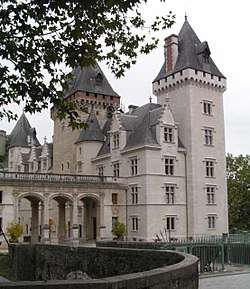
Joseph-Auguste Lafollye was born in 1828.[1] He studied architecture at the school of architecture in the Académie des Beaux-Arts (Paris) under M. Gilbert, and won the school's second prize in 1855.[2]
Lafollye and Gabriel-Auguste Ancelet were the architects for the restoration of the Château de Pau. During the construction of the Villa Eugénie for the Emperor Napoleon III and his wife Eugénie, Ancelet was given responsibility for the project in 1857, and then Lafollye was assigned to the project in 1864. Lafollye added an attic with rooms for the staff.[3]
Working under the direction of Eugène Viollet-le-Duc, Lafollye was responsible for restoring the rich statuary of the 16th century Hôtel de Ville at Compiègne, which had been vandalized during the revolution.[4] He restored the abbey church of Saint-Jean de Sorde-l’Abbaye and the old Cathédrale Notre-Dame-de-l'Assomption de Lescar.[5] He restored the church of Saint André at Sauveterre-de-Béarn, which dates back to at least 1251, between 1867 and 1869. This involved restoring the western facade, building the porch and vestry, and a complete renovation and restoration of the main gate.[6]
Lafollye was the architect for the courthouse at Pau, Pyrénées-Atlantiques.[7] In 1863 he was assigned the job of building a new church at Oloron-Sainte-Marie to replace the old chapel of the Capuchins. The foundation stone was laid on 15 August 1869.[8] In 1870 he was awarded a medal of honor at the Salon for the design of the church of Notre-Dame at Oloron, and his drawings of the restoration of the Château de Pau.[9][7] Joseph-Auguste Lafollye was decorated in 1876. At the Exposition Universelle (1878) he received a first class medal.[10]
There were delays and disputes over the quality of the work at Oloron between Lafollye, the contractor and the municipality. Eventually, in 1883 Lafollye resigned.[8] Napoleon III had assigned the task of restoring the Château de Saint-Germain-en-Laye to Eugène Millet, who started the work in 1862. Lafollye took over responsibility in 1879 on Millet's death, continuing until 1889. His goal, and that of his successor Honoré Daumet, was to restore the French Renaissance style of Francis I.[11]
Joseph-Auguste Lafollye was made an officer of the Academy in 1889.[12] He died in Paris in 1891 at his home on the Rue Richepanse, aged sixty three.[10] Auguste Lafollye's son Charles Paul Lafollye was also an architect, who obtained honorable mention at the Exposition Universelle (1889) in Paris.[13]
Gallery
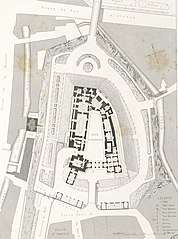 General plan of the Château de Pau
General plan of the Château de Pau_-_Fonds_Ancely_-_B315556101_A_LAFOLLYE_082.jpg) Facade (1882)
Facade (1882)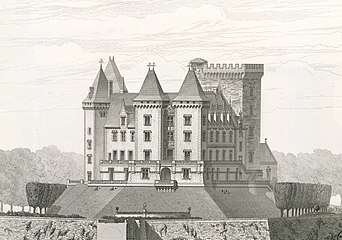 Southwest elevation
Southwest elevation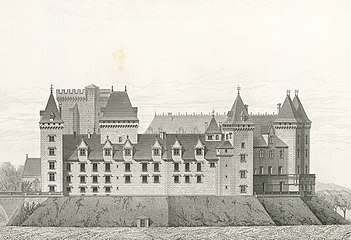 Northern elevation
Northern elevation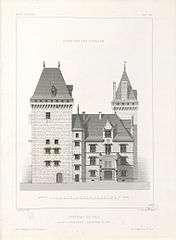 North end
North end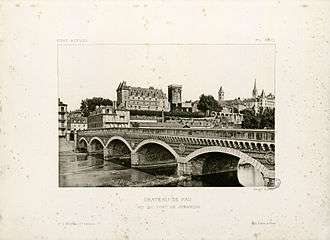 View of the chateau from the Jurançon bridge
View of the chateau from the Jurançon bridge
Bibliography
- Lafollye, August (1882). Le Chateau de Pau: histoire et description. Paris.
Lafollye published works about other historical buildings, including the Château de Compiègne and the Chateau of Saint-Germain.[14]
References
Citations
- Boulet 2006, p. 172.
- Académie des Beaux-Arts (Paris) 1855, p. 14.
- Granger 2005, p. 236.
- Napoléon III à Compiègne.
- Lemaître 2010.
- Sánchez-Marco 2005.
- Mémorial des Pyrénées...
- Oloron - Sainte Marie.
- Revue générale de l'architecture 1870, p. 90.
- Nécrologie 1891, p. 159-160.
- Boulet 2006, p. 189.
- Société française d'archéologie 1889, p. 52.
- LAFOLLYE Charles, Paul: ELEC.
- Weinreb 1988.
| Wikimedia Commons has media related to Joseph-Auguste Lafollye. |
Sources
- Académie des Beaux-Arts (Paris) (1855). Séance publique annuelle. p. 14. Retrieved 2013-06-12.CS1 maint: ref=harv (link)
- Boulet, François (2006). Leçon d'histoire de France Saint-Germain-en-Laye: Des antiquités nationales à une ville internationale. DISLAB. ISBN 978-2-9520091-8-8. Retrieved 2013-06-12.CS1 maint: ref=harv (link)
- Granger, Catherine (2005). L'Empereur et les arts: la liste civile de Napoléon III. Librairie Droz. ISBN 978-2-900791-71-4. Retrieved 2013-06-11.CS1 maint: ref=harv (link)
- "LAFOLLYE Charles, Paul". ELEC. École nationale des chartes. Retrieved 2013-06-11.
- Lemaître, Capucine (2010). "La restauration du décor des églises de Lescar et de Sorde-l'Abbaye par Joseph Auguste Lafollye au xixe siècle : de la redécouverte d'un patrimoine à sa recréation". La revue de Pau et du Béarn. Retrieved 2013-06-12.CS1 maint: ref=harv (link)
- "Mémorial des Pyrénées, 58e année, n°62, 24 mai 1870". Médiathèques de Pau. Archived from the original on 2013-06-20. Retrieved 2013-06-12.
- "Napoléon III à Compiègne" (PDF). Ville Impérial. Archived from the original (PDF) on 2014-02-24. Retrieved 2013-06-12.
- "Nécrologie". Beaux-arts: revue d'information artistique. 1891. Retrieved 2013-06-12.
- "Oloron - Sainte Marie". Atlas du Patrimoine Historique et Culturel (Navarre). fundacion Lebrel Blanco. Retrieved 2013-06-12.
- Revue générale de l'architecture (1870). "Chronique". Revue générale de l'architecture et des travaux publics: journal des architectes, des ingénieurs, des archéologues, des entrepreneurs, des industriels du bâtiment, etc. : histoire, théorie, pratique, mélanges. Schmid. Retrieved 2013-06-12.CS1 maint: ref=harv (link)
- Sánchez-Marco, Carlos (2005). "Sauveterre de Béarn". Historia Medieval del Reyno de Navarra. Fundación Lebrel Blanco. Retrieved 2013-06-12.CS1 maint: ref=harv (link)
- Société française d'archéologie (1889). Congrès archéologique de France. Retrieved 2013-06-12.CS1 maint: ref=harv (link)
- Weinreb, B. (1988). French architecture: a selection of books from the nineteenth and twentieth centuries, including some reprints and reference works relating to earlier periods. Weinreb Architectural Books at Henry Sotheran. Retrieved 2013-06-12.CS1 maint: ref=harv (link)